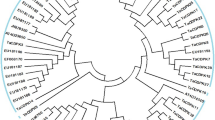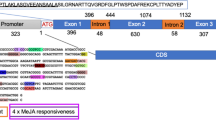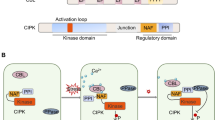Abstract
Due to global warming, high temperature has become the main abiotic stress affecting plant growth worldwide. LysM-containing receptor-like kinase 4 (LYK4) is the receptor for chitin, and ERECTA(ER) is a key factor in plant tolerance to high temperature. In this study, we constructed a chitin-induced chimeric LYK4-ER gene, in which the extracellular region and transmembrane domain of the LYK4 gene are fused with the intracellular region of the ER gene. Colony PCR, RT-PCR and western blot analyses of LYK4-ER transcription in plants, confirmed that the LYK4-ER gene was successfully constructed and transferred into Arabidopsis. The LYK4-ER gene localized to the cytomembrane and cytoplasm in vivo because of the binding properties of the transmembrane domain of the LYK4-ER gene to the cell membrane. The transgenic plants showed a higher germination rate and germination index as well as a shorter mean germination time than the wild-type plants, indicating that the LYK4-ER gene increases the heat tolerance of Arabidopsis. The lower H2O2 content and relative electrolytic leakage of the transgenic plants showed that the status of these plants under heat stress was improved. UPLC-MS/MS was used to analyze the phytohormones content, which suggested that the transgenic plants exhibited improved heat tolerance through jasmonic acid signal transduction pathways.






Similar content being viewed by others
References
Adegbuyi E, Cooper SR, Don R (1981) Osmotic priming of some herbage grass seed using polyethylene glycol (PEG). Seed Sci Technol 9(3):867–878
Anastasis C, Panagiota F, Manganaris GA et al (2014) Sodium hydrosulfide induces systemic thermotolerance to strawberry plants through transcriptional regulation of heat shock proteins and aquaporin. BMC Plant Biol 14(1):42–42
Bari R, Jones JDG (2009) Role of plant hormones in plant defence responses. Plant Mol Biol 69(4):473–488
Baron KN, Schroeder DF, Stasolla C (2012) Transcriptional response of abscisic acid (aba) metabolism and transport to cold and heat stress applied at the reproductive stage of development in Arabidopsis thaliana. Plant Sci 188–189:0–59
Boller T (1995) Chemoperception of microbial signals in plant cells. Annu Rev Plant Physiol Plant Mol Biol 46(1):189–214
Davies PJ (2004) Plant hormones: biosynthesis, signal transduction, action [M]. Kluwar Academic Publishers, Norwell, pp 1–15
Guan YJ, Hu J, Wang XJ et al (2009) Seed priming with chitosan improves maize germination and seedling growth in relation to physiological changes under low temperature stress. J Zhejiang Univ Sci B (Biomedicine & Biotechnology) 10(6):427–433
Guo M, Liu JH, Ma X et al (2016) The Plant heat stress transcription factors (HSFs): structure, regulation, and function in response to abiotic stresses. Front Plant Sci 7(273):114
Kanchan V, Neha U, Nitin K et al (2017) Abscisic acid signaling and abiotic stress tolerance in plants: a review on current knowledge and future prospects. Front Plant Sci 08:1–12
Khan AA (1992) Preplant physiological seed conditioning. Hortic Rev 13:131–181
Khedia J, Agarwal P, Agarwal PK (2019) Deciphering hydrogen peroxide-induced signalling towards stress tolerance in plants. Biotech 9(11):395
Li ZG, Yang SZ, Long WB et al (2013) Hydrogen sulphide may be a novel downstream signal molecule in nitric oxide-induced heat tolerance of maize (Zea mays L.) seedlings. Plant Cell Environ 36(8):1564–1572
Liu T, Liu Z, Song C et al (2012) Chitin-induced dimerization activates a plant immune receptor. Science 336(6085):1160–1164
Lizárraga-Paulín EG, Torres-Pacheco I, Moreno-Martínez E et al (2011) Chitosan application in Maize (Zea mays) to counteract the effects of abiotic stress at seedling level. Afr J Biotech 10(34):6439–6446
Manvi S, Ashverya L (2016) Jasmonates: emerging players in controlling temperature stress tolerance. Front Plant Sci 6:1–10
Masle J, Gilmore SR, Farquhar GD (2005) The ERECTA gene regulates plant transpiration efficiency in Arabidopsis. Nature 436(7052):866–870
Miya A, Albert P, Shinya T et al (2007) CERK1, a LysM receptor kinase, is essential for chitin elicitor signaling in Arabidopsis. Proc Natl Acad Sci USA 104(49):19613–19618
Narusaka Y, Shinya T, Narusaka M et al (2013) Presence of LYM2 dependent but CERK1 independent disease resistance in Arabidopsis. Plant Signal Behav 8(9):e25345
Peng S, Huang J, Sheehy JE et al (2004) Rice yields decline with higher night temperature from global warming. Proc Natl Acad Sci USA 101(27):9971–9975
Petutschnig EK, Jones AME, Serazetdinova L et al (2010) The lysin motif receptor-like kinase (LysM-RLK) CERK1 is a major chitin-binding protein in Arabidopsis thaliana and subject to chitin-induced phosphorylation. J Biol Chem 285(37):28902–28911
Qi Y, Hai H (2004) ERECTA is required for protection against heat-stress in the AS1/AS2 pathway to regulate adaxial-abaxial leaf polarity in Arabidopsis. Planta 219(2):270
Qu XY, Zhao Z, Tian ZX (2017) ERECTA regulates cell elongation by activating auxin biosynthesis in Arabidopsis thaliana. Front Plant Sci 8:1688
Ramonell K, Berrocal-Lobo M, Koh S et al (2005) Loss-of-function mutations in chitin responsive genes show increased susceptibility to the powdery mildew pathogen Erysiphe cichoracearum. Plant Physiol 138(2):1027
Ruan SL, Xue QZ (2002) Effects of chitosan coating on seed germination and salt-tolerance of seedlings in hybrid rice (Oryza sativa L.). Acta Agronom Sin 28(6):803–808
Sagor GH, Berberich T, Takahashi Y et al (2013) The polyamine spermine protects Arabidopsis from heat stress-induced damage by increasing expression of heat shock-related genes. Transgen Res 22(3):595
Shen H, Zhong X, Zhao F et al (2015) Overexpression of receptor-like kinase ERECTA improves thermotolerance in rice and tomato. Nat Biotechnol 33(9):996
Shibuya N, Minami E (2001) Oligosaccharide signalling for defence responses in plant [J]. Physiol Mol Plant Pathol 59(5):223–233
Solomon S (2007) Contribution of working group I to the fourth assessment report of the intergovernmental panel on climate change, climate change 2007: the physical science basis. Cambridge University Press, New York, pp 159–254
Sonna LA, Fujita J, Gaffin SL et al (2002) Invited review: effects of heat and cold stress on mammalian gene expression. J Appl Physiol 92(4):1725–1742
Wan J, Tanaka K, Zhang XC et al (2012) LYK4, a LysM receptor-like kinase, is important for chitin signaling and plant innate immunity in Arabidopsis. Plant Physiol 160(1):396–406
Zhang J, Schurr U, Davies et al (1987) Control of stomatal behaviour by abscisic acid which apparently originates in the roots. J Exp Bot 38(7):1174–1181
Zhang Y, Mian MA, Chekhovskiy K et al (2005) Differential gene expression in Festuca under heat stress conditions. J Exp Bot 56(413):897–907
Author information
Authors and Affiliations
Corresponding author
Electronic Supplementary Material
Below is the link to the electronic supplementary material.
Rights and permissions
About this article
Cite this article
Chen, L., Xia, W., Song, J. et al. The Chitin-Induced Chimeric LYK4-ER Gene Improves the Heat Tolerance of Arabidopsis at the Seedling Stage. J. Plant Biol. 63, 279–288 (2020). https://doi.org/10.1007/s12374-020-09249-3
Received:
Revised:
Accepted:
Published:
Issue Date:
DOI: https://doi.org/10.1007/s12374-020-09249-3




